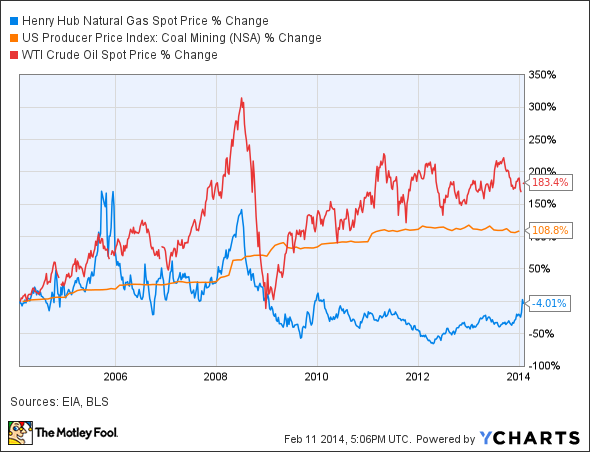No energy source has gained more from recent technology advancements and environmental regulations than natural gas. While coal plants are being shut down by the hundreds, natural gas plants are popping up to replace them, recently becoming the biggest producer of electricity in the United States.

The energy source has even gained a lot of ground on the transportation side as well. Clean Energy Fuels (CLNE 1.38%) is building a national infrastructure of natural gas fueling stations, and Westport Innovations (WPRT 1.85%) is making it possible to run massive trucks on the same gas that fuels your home.
It seems there's no limit to what natural gas can be used for, so what is the future of this energy source?
Natural gas' growing importance
For decades, natural gas' role in the U.S. has grown in a variety of end markets. Natural gas replaced propane for heating most homes in the winter, coal was replaced by natural gas as the biggest producer of electricity, and now it's seen as an alternative fuel source for automobiles because the price of oil is so high.
These diverse end markets and high availability make it a natural energy source to turn to when an alternative is needed. The U.S. Energy Information Administration projects that its share of energy production will continue to grow over the next 25 years as well.

The driver of natural gas' importance is twofold. First, fracking technology advanced by Haliburton (HAL +0.68%) and Schlumberger (SLB +0.29%) has resulted in a huge increase in natural gas production in the United States. That added production led to falling prices over the past decade, while coal and oil prices soared.
Henry Hub Natural Gas Spot Price data by YCharts.
As a result, natural gas became the fuel of choice for electricity producers, and a cost saver for businesses and homes switching to natural gas. I don't think there's anything slowing this momentum, because dirtier fuels are becoming more costly, and alternative energy doesn't yet have the scale to make a dent in natural gas. The question today is whether success in power generation and heating will transfer to transportation as well.
Can natural gas fuel the automobile of the future?
A lot of work has been done in recent years to turn natural gas into a transportation fuel -- no easy task for an energy source that doesn't normally pack a lot of energy in a small space. What companies like Clean Energy Fuels are doing is either compressing or liquefying natural gas, then transporting it to fueling stations around the country, where it's used in relatively newly designed buses and trucks.
This is the next growth avenue for natural gas, but it's just as price-sensitive as electricity and heating. The recent spike in the price of natural gas will have a dampening effect on demand from transportation, and let's not forget that companies like Clean Energy Fuels are still benefiting from government subsidies for natural gas fuel.
There's upside potential in transportation, but there are a lot of hurdles to overcome before it competes with oil in a big way. The recent spike in the price of natural gas shows the biggest hurdle, and that price sensitivity is why I don't think natural gas cars are coming your way any time soon.
What is the future of natural gas?
More than most energy sources, natural gas demand will be driven by price. Ironically, that will also be its biggest hindrance to energy domination.
One of the reasons natural gas prices have spiked over the past month is that new drilling slowed down rapidly last year, when prices were extremely low. When temperatures got cold, demand pushed prices higher, producing the spike we've seen in 2014.
If prices remain high, drilling will pick up again, and prices will come down. It's a very elastic business, but we shouldn't expect prices to stay as low as they've been in the past two years. Companies such as Quicksilver Resources (NYSE: KWK), which made leveraged bets on natural gas drilling, have been pummeled in recent years because prices were so low they couldn't make a profit. If prices remain high, Quicksilver's big bet will pay off, and Halliburton and Schlumberger will sell more equipment, so there is big upside for investors with these companies.
Despite the sensitive-price dynamic, momentum is very favorable in the electrical market for natural gas. Coal and nuclear costs are rising, and renewable energy from wind and solar is a small percentage of the grid and actually complimentary to the peaking power provided by natural gas.
The transportation market will be tougher, and I think it'll be a long road to get natural gas into a large number of passenger vehicles. Trucks may make the switch slowly, but even Clean Energy Fuels and Westport Innovations have been disappointing recently because the uptick in sales hasn't been as fast as expected.
On an absolute basis, natural gas will see the biggest growth of any energy source over the next decade, no matter what happens in transportation. Whether that benefits natural gas producers or consumers will depend on price, but it's a good time to be in natural gas.










